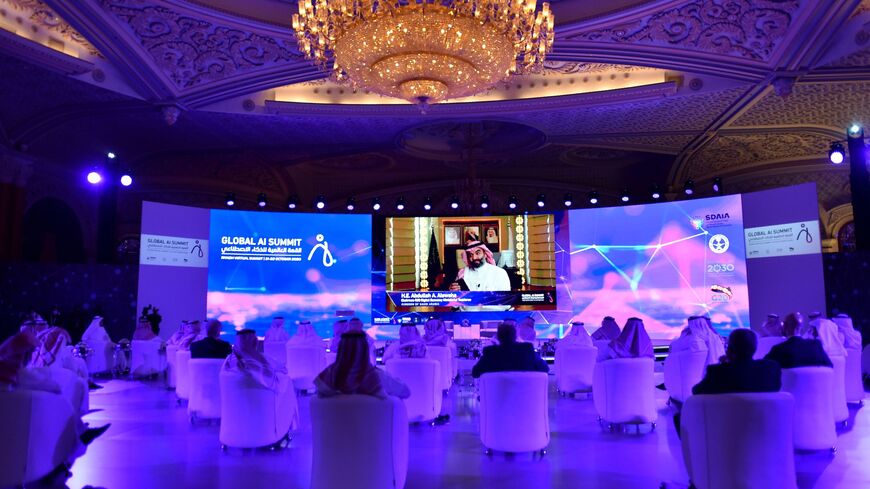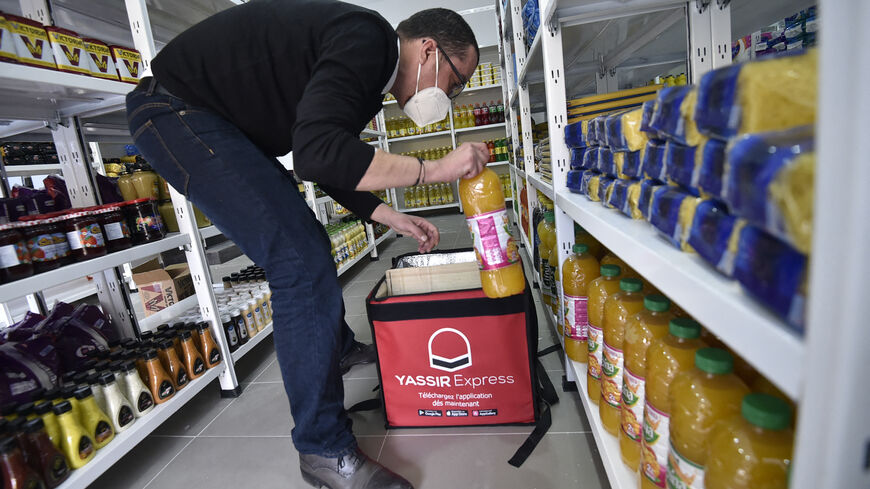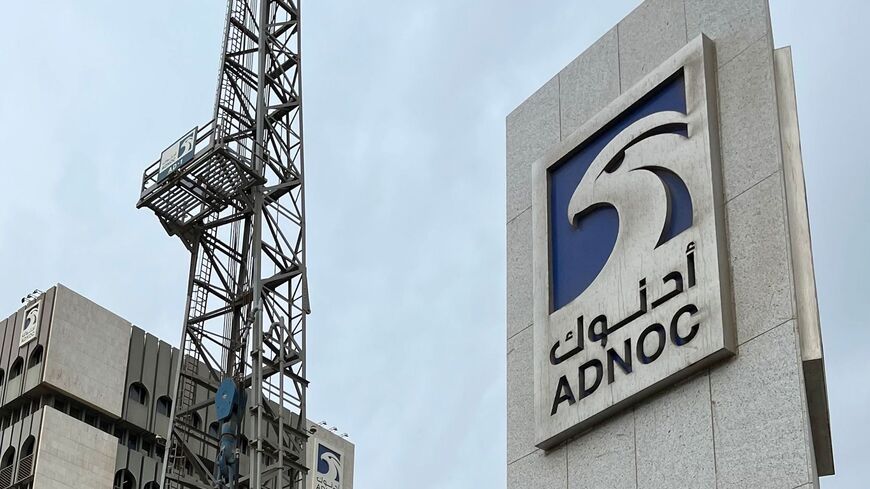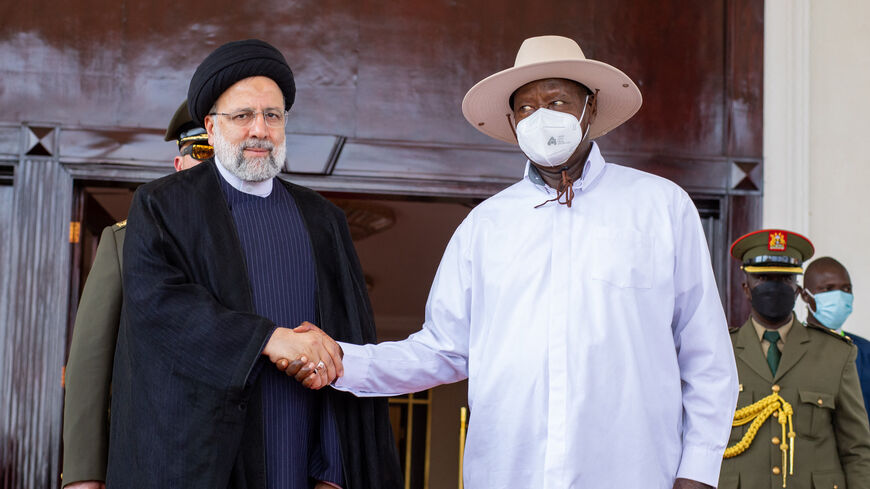Saudi Arabia’s ambitions loom large over UAE’s business expat community
Al-Monitor Pro Members
Samuel Wendel
Senior Market Research Analyst, Al-Monitor
Feb. 1, 2023
2023 has arrived with the GCC’s business expat community caught between the ambitions of Riyadh and Abu Dhabi. Saudi Arabia is requiring multinationals to relocate regional headquarters to Riyadh by year’s end if they want access to lucrative government contracts in 2024. It’s a bold attempt to pry businesses and their senior management away from well established hubs in Abu Dhabi and especially Dubai, but the UAE isn’t ignoring threats to its status as the region’s premier business hub, although a new corporate tax could undermine its position. That’s setting up a showdown in 2023 between Gulf countries that could upend the GCC’s business expat community.
- Foreign labor famously powers GCC economies: expats comprise roughly 90% of the population in the UAE and Qatar, and about 70% in Kuwait. Larger Saudi Arabia is the obvious outlier, where roughly a third of its 36 million inhabitants are foreigners.
- Amid efforts to boost national employment and develop economies, Gulf governments are simultaneously seeking wealthy expats and skilled professionals while limiting opportunities for foreigners with less specialized skills. For instance, Oman in 2022 banned foreigners from over 200 job roles.
- The UAE wants to boost Emiratization in the private sector to 10% by 2026, while Saudi Arabia is localizing many professions. Riyadh plans on seeing 100% Saudization of key aviation jobs in 2023, including copilots, air controllers and dispatchers.
- However, Gulf economies will rely heavily on skilled foreign professionals in the near-term, as local citizens generally work in the public sector and many lack the expertise needed to replace expats in the private sector.
- Notably, Saudi Arabia’s Crown Prince Mohammed bin Salman wants to project the kingdom as an increasingly modern society and has ambitious goals such as populating the megacity NEOM with 9 million people by 2045, with foreigners driving growth.
- Despite recent reforms, Saudi Arabia still features plenty of restrictions, with its minority western expat population usually living in isolated compounds. That contrasts with Dubai, which offers an overall lifestyle more comparable to the West.
- The UAE has successfully courted global businesses and expats with a slew of measures, like launching its Golden Visa program in 2019 to offer 10-year residency visas to investors, entrepreneurs and skilled professionals. It issued 79,617 golden visas in 2022, up from 47,150 from 2021, according to government stats.
- The UAE was expected to attract 4,000 millionaires in 2022, ranking first on the list of countries with the highest projected net inflows of high-net-worth individuals, according to the Henley Private Wealth Migration Dashboard.
- Bahrain also announced a Golden Residency Visa in 2022, while Oman has launched a program offering foreign investors and retirees long-term residence rights.
- In 2019, Saudi Arabia introduced a Permanent Premium Residency option aimed at investors and entrepreneurs. It comes with a one-time fee of $213,000 and allows recipients to reside in the country without a sponsor.
- Saudi Arabia also instituted new labor laws in 2021 allowing expats to switch jobs without seeking employer approval. Foreign employees can now also obtain travel permits without employer permission.
- Under Saudi Arabia’s regional headquarters initiative, multinationals from Google to Siemens are being offered various labor and visa policy exemptions to relocate MENA headquarters to Riyadh. Crucially, it also dictates eligibility for government contracts starting in January 2024.
- New regional headquarters must house strategic direction and management functions, but other activities are optional, including sales and marketing support, HR, accounting and legal, among others.
- As of 2021, 44 multinationals including Deloitte, Unilever and Siemens had agreed to relocate. According to Bloomberg, Saudi officials were talking to 7,000 companies globally about the initiative and the scheme includes plans to turn Riyadh’s King Abdullah Financial District into a special zone with offshore status.
- It’s still uncertain how the regulations will be implemented and enforced and what specific incentives are available to companies that relocate, according to the International Trade Administration. In January 2023, local media reported on several exceptions to the rule. For instance, government entities can work with foreign firms lacking Saudi headquarters if there aren’t competing bids for a contract.
- However, other factors complicate Saudi Arabia’s ambitions to lure expats. One is Article 77, a labor rule enabling employers to instantly fire someone without cause and cancel work and residency permits. In 2022, the Financial Times reported on KPMG Saudi Arabia’s hostile work environment for expats and abrupt terminations using Article 77.
- Saudi Arabia’s new privacy and data law, called the PDPL, is also expected to raise costs of doing business and complicate efforts to attract foreign investors. Enforcement of the PDPL has been postponed until March 2023.
- Meanwhile, the UAE’s new unemployment insurance scheme took effect in January 2023, which is designed to protect expats and Emirati workers and enhance financial security. This comes after a significant overhaul of its labor law for private sector workers in 2022.
- The UAE also plans to start taxing business profits for the first time in June 2023. The 9% tax applies to profits exceeding approximately $102,000, while existing entities in free zones can still benefit from zero taxes. Other GCC countries also feature corporate tax, including Saudi Arabia's 20% levy on foreign-owned firms.
- Dubai temporarily scrapped its 30% tax on alcohol sales in 2023. Unlike GCC neighbors, the UAE has also changed to the Western weekend of Saturday-Sunday instead of Friday-Saturday.
- American cinema giant AMC announced in January 2023 that it was exiting its equity partnership in Saudi Arabia. Despite backing from Saudi’s Public Investment Fund, AMC lagged behind competitors, reported The Wall Street Journal, with its exit illustrating how the kingdom remains a difficult place for international companies to operate in despite changes under Mohammed bin Salman.
Scenario 1: Saudi Arabia doubles down in 2023
As companies relocate to Riyadh, the kingdom presses its new advantage with additional incentives — from broader visa policy liberalizations to relaxing social restrictions. It could even expand its headquarters initiative, including adding certain rules on doing business with the local private sector.
That said, it could also go too far, and additional requirements and regulations could give expats and businesses pause. The headquarters law is already controversial — policy shifts and more ambiguity could scare away business, while aggressively pushing more reforms may foster local discontent. The headquarters law has Saudization exemptions, but such policies could also clash with other efforts to attract expats.
Scenario 2: Gulf countries face a critical talent shortage
Local expat populations fail to rebound strongly after dipping during the COVID-19 pandemic as rising costs and expanding workforce nationalization quotas limit opportunities for skilled foreigners. GCC countries face acute talent shortages that threaten economic development plans, forcing moves like expanded digital nomad visas or more pathways to citizenship.
However, the Gulf’s white collar expat pipeline is unlikely to completely dry up, as the region is producing attractive opportunities in key sectors. Plus, the United States, Europe and Asia are seeing layoffs in tech and finance, creating openings for Gulf countries to entice free agents. Smaller Gulf states also face less pressure to nationalize workforces than Saudi Arabia.
Saudi Arabia’s competition with the UAE will loom large over the GCC’s business expat community in 2023, overshadowing moves by other Gulf states to attract global talent and wealth. Numerous companies will shift senior staff from Dubai to Riyadh to access lucrative opportunities in the region’s largest market, but many will simultaneously maintain significant UAE footprints unless Saudi Arabia draws a hard line, which it has not yet done. Dubai appears to be taking this challenge seriously, evidenced by its alcohol tax suspension, which conveniently burnishes its expat friendly image and tourism appeal. The UAE should seek to shore up competitive advantages in 2023, giving leverage to top multinationals to extract benefits, especially since its corporate tax could erode its appeal and hurt startups. That said, it’s still unclear if Saudi Arabia can deliver on promises to multinationals and equal the UAE’s innovative policies without resorting to ultimatums. Crucially, relocating to Riyadh will be a difficult decision for some multinationals to justify to expat staff, as they will become a fractional minority in a country so far lacking Dubai’s lifestyle amenities. That will persist until the kingdom eases more social restrictions and makes tangible progress on megaprojects like NEOM. Expect Riyadh’s business expat community to grow in 2023, but it won’t become Dubai in the desert overnight.
Samuel Wendel is a senior market research analyst with Al-Monitor covering economic, tech and business trends across the Middle East. He has previously served as a journalist with Forbes Middle East and Wamda, where he reported on key industry developments spanning a range of sectors in the region.
To get Al-Monitor PRO updates straight to your phone, text ALM to (202) 978-4542
We're glad you're interested in this memo.
Memos are one of several features available only to PRO Expert members. Become a member to read the full memos and get access to all exclusive PRO content.

Already a Member? Sign in
The Middle East's Best Newsletters
Join over 50,000 readers who access our journalists dedicated newsletters, covering the top political, security, business and tech issues across the region each week.
Delivered straight to your inbox.
Free
What's included:
Free newsletters available:
- The Takeaway & Week in Review
- Middle East Minute (AM)
- Daily Briefing (PM)
- Business & Tech Briefing
- Security Briefing
- Gulf Briefing
- Israel Briefing
- Palestine Briefing
- Turkey Briefing
- Iraq Briefing
Premium Membership
Join the Middle East's most notable experts for premium memos, trend reports, live video Q&A, and intimate in-person events, each detailing exclusive insights on business and geopolitical trends shaping the region.
$25.00 / month
billed annually
$31.00 / month
billed monthly
What's included:
Memos - premium analytical writing: actionable insights on markets and geopolitics.
Live Video Q&A - Hear from our top journalists and regional experts.
Special Events - Intimate in-person events with business & political VIPs.
Trend Reports - Deep dive analysis on market updates.
We also offer team plans. Please send an email to pro.support@al-monitor.com and we'll onboard your team.
Already a Member? Sign in






